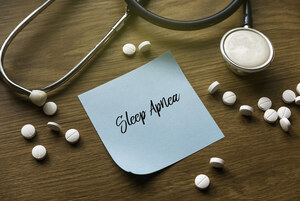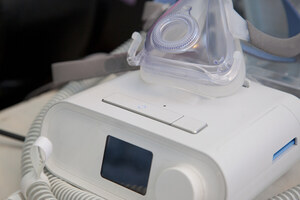LAWSUITS NEWS & LEGAL INFORMATION
CPAP Sleep Machines Recalled, CPAP Lung Cancer Lawsuit Filed
By Jane Mundy
Philips, the medical device manufacturer, is facing class-action lawsuits from consumers, including a CPAP lung cancer lawsuit, alleging the company knew about the risks associated with its CPAP and BiPAP machines a considerable time before it recalled millions of sleep machines.
CPAP machines are breathing devices that help treat sleep apnea symptoms-- a condition where a person stops and starts breathing repeatedly while they sleep. Patients who are not able to breathe enough on their own or have obstructive sleep apnea are prescribed these ventilator machines to keep their airways open during sleep.
CPAP devices provide steady air pressure through a mask or nosepiece, which allows air to move in and out of a patient’s lungs. Continuous positive airway pressure prevents the user’s airway from collapsing, and thereby preventing constant broken sleep.
Exposure to this debris or chemicals could cause serious adverse events, from irritation (skin, eye, and respiratory tract) and inflammation to respiratory problems and toxic carcinogenic effects.
There is some speculation that this earlier warning and the massive Philips Respironics CPAP recall are associated, particularly because Philips also included a warning about the use of ozone cleaning techniques in this recall.
The FDA received numerous reports of CPAP cleaning problems involving use of ozone or UV light products from 2017 through 2019. Consumers reported coughing, difficult breathing, nasal irritation, headaches, asthma attacks and other breathing problems after using the unapproved products.
HME News, which provides coverage of the medical equipment industry, interviewed multiple CPAP cleaning device manufacturers, all of whom said they had no indication the recall was connected to any of their products and that a connection to their cleaning equipment is unlikely for a variety of reasons.
Most of the recalled devices come from Philips’ DreamStation line. The recall affects all serial numbers of the following affected devices manufactured between 2009 and April 26, 2021.
In a memo to care providers Philips acknowledged the risks: “Lab testing performed for and by Philips has also identified the presence of VOCs which may be emitted from the sound abatement foam component of affected device(s). VOCs are emitted as gases from the foam included in the CPAP, BiLevel PAP and MV devices and may have short- and long-term adverse health effects.”
In a news release, Heller’s attorney stated: “Philips Respironics has not disclosed when it first received reports from users of its Sleep & Respiratory Care devices of the presence of black debris or particles within the airpath circuit. But given how long the devices have been on the market, it’s unlikely that the company only recently learned of these issues…Meanwhile, Philips continued to rake in profits from its CPAP and BiPAP machines while putting users at risk of serious health issues, including cancer.”
Leading up to the recall, Philips announced in April 2021 that it had received numerous complaints of “black debris within the device’s air pathway” and reports of headache, upper airway irritation, cough, chest pressure, and sinus infection in users of the devices.
The recalled devices are classified as “Class 2 devices”, meaning they are not required to undergo the premarket approval process that is required for more serious Class 3 medical devices. Instead, Class 2 devices only need to show a substantial equivalence to a legally marketed device to be legally sold in the U.S.
More lawsuits against Philips are expected to be filed. To date, respiratory problems and multiple types of cancer are among the side effects named in Philips CPAP lawsuits.
Last updated on
FREE CPAP LUNG CANCER LAWSUIT EVALUATION
Send your CPAP Lung Cancer claim to a lawyer who will review your claim at NO COST or obligation.
GET LEGAL HELP NOW
GET LEGAL HELP NOW
CPAP machines are breathing devices that help treat sleep apnea symptoms-- a condition where a person stops and starts breathing repeatedly while they sleep. Patients who are not able to breathe enough on their own or have obstructive sleep apnea are prescribed these ventilator machines to keep their airways open during sleep.
CPAP devices provide steady air pressure through a mask or nosepiece, which allows air to move in and out of a patient’s lungs. Continuous positive airway pressure prevents the user’s airway from collapsing, and thereby preventing constant broken sleep.
Sleep Machine Risks
According to the FDA, the polyester-based polyurethane (PE-PUR) sound abatement foam, which is used to reduce sound and vibration in these CPAP devices, may break down and potentially enter the device’s air pathway. Black debris or particles from the foam or certain chemicals released into the device’s air pathway may be inhaled or swallowed by the user.Exposure to this debris or chemicals could cause serious adverse events, from irritation (skin, eye, and respiratory tract) and inflammation to respiratory problems and toxic carcinogenic effects.
FDA Warning
The FDA has given the ventilators a Class I recall, which is the most serious type of recall. “These issues can result in serious injury, which can be life-threatening, cause permanent impairment, and require medical intervention to prevent damage,” the FDA safety communication warns. FDA advises users or caregivers of affected BiPAP or CPAP machines to stop using the devices immediately, switch to another device which is not part of the recall, or use alternative treatments for sleep apnea.Previous Warnings
In a similar warning earlier this year the FDA warned patients and health care professionals not to use illegally marketed ozone gas or ultraviolet (UV) light cleaning products to disinfect or sanitize CPAP machines.There is some speculation that this earlier warning and the massive Philips Respironics CPAP recall are associated, particularly because Philips also included a warning about the use of ozone cleaning techniques in this recall.
The FDA received numerous reports of CPAP cleaning problems involving use of ozone or UV light products from 2017 through 2019. Consumers reported coughing, difficult breathing, nasal irritation, headaches, asthma attacks and other breathing problems after using the unapproved products.
HME News, which provides coverage of the medical equipment industry, interviewed multiple CPAP cleaning device manufacturers, all of whom said they had no indication the recall was connected to any of their products and that a connection to their cleaning equipment is unlikely for a variety of reasons.
Philips Recall
In June 2021 Philips recalled millions of its DreamStation devices that are used by patients with sleep apnea. Also recalled are as Bi-PAP and ventilator devices, which may face issues with foam degradation. Philips said the foam degradation may be exacerbated by the use of unapproved cleaning methods, such as ozone, and high heat and high humidity environments may also contribute to foam degradation.Most of the recalled devices come from Philips’ DreamStation line. The recall affects all serial numbers of the following affected devices manufactured between 2009 and April 26, 2021.
Philips Lung Cancer Lawsuit
Frederick Heller filed a lawsuit against Phillips in Columbus, Georgia, alleging his lung cancer was caused by using “for a number of years” a REMstar Auto A-Flex device -- one of the recalled sleep machines—to treat his sleep apnea. Heller was diagnosed with lung cancer in June 2021, shortly after the recall.In a memo to care providers Philips acknowledged the risks: “Lab testing performed for and by Philips has also identified the presence of VOCs which may be emitted from the sound abatement foam component of affected device(s). VOCs are emitted as gases from the foam included in the CPAP, BiLevel PAP and MV devices and may have short- and long-term adverse health effects.”
In a news release, Heller’s attorney stated: “Philips Respironics has not disclosed when it first received reports from users of its Sleep & Respiratory Care devices of the presence of black debris or particles within the airpath circuit. But given how long the devices have been on the market, it’s unlikely that the company only recently learned of these issues…Meanwhile, Philips continued to rake in profits from its CPAP and BiPAP machines while putting users at risk of serious health issues, including cancer.”
Leading up to the recall, Philips announced in April 2021 that it had received numerous complaints of “black debris within the device’s air pathway” and reports of headache, upper airway irritation, cough, chest pressure, and sinus infection in users of the devices.
The recalled devices are classified as “Class 2 devices”, meaning they are not required to undergo the premarket approval process that is required for more serious Class 3 medical devices. Instead, Class 2 devices only need to show a substantial equivalence to a legally marketed device to be legally sold in the U.S.
More lawsuits against Philips are expected to be filed. To date, respiratory problems and multiple types of cancer are among the side effects named in Philips CPAP lawsuits.
CPAP Lung Cancer Legal Help
If you or a loved one has suffered similar damages or injuries, please fill in our form and your complaint will be sent to a lawyer who may evaluate your claim at no cost or obligation.Last updated on
CPAP LUNG CANCER LEGAL ARTICLES AND INTERVIEWS
Philips Settles Respirator Case for $1.1 Billion

Problems with Philips CPAP Replacement Machines

Philips Cuts Deal with Owners of Recalled CPAP Machines and Lawsuit Claims FDA Fails CPAP Users


May 9, 2024
Philips Respironics has agreed to settle over 700 lawsuits for $1.1 billion. Since the massive 2021 recall of its faulty breathing machines and ventilators that released toxic and carcinogenic fumes into customers’ mouths, throats and lungs, more than 50,000 people have been involved in the litigation. READ MORE
Problems with Philips CPAP Replacement Machines

January 10, 2024
Nearly two years after Philips Respironics recalled millions of CPAP machines, including ventilators for the sick and dying and DreamStation for sleep apnea patients--including children, consumers are still having problems. A recent investigation has found that the new replacement breathing machines might also be emitting dangerous chemicals. Meanwhile, people who have bought, leased or rented certain Philips sleep apnea machines can now file a claim for restitution--but that may be premature. READ MORE
Philips Cuts Deal with Owners of Recalled CPAP Machines and Lawsuit Claims FDA Fails CPAP Users

October 9, 2023
Philips Respironics has cut a deal with CPAP machine consumers who are part of the class action lawsuits. The $479 million proposed settlement covers reimbursement costs to consumers who purchased, leased or rented the defective devices. Depending on the CPAP, BiPAP or mechanical ventilator model, claimants can expect from $55 to $1,552 per device, and an extra $100 for every device returned. And of that amount, $34 million is allocated to health insurance companies and others who paid to reimburse users to replace the machines. READ MORE
READ MORE Defective Products Settlements and Legal News
READ MORE Drugs/Medical Settlements and Legal News
READ MORE Personal Injury Settlements and Legal News
READ MORE Drugs/Medical Settlements and Legal News
READ MORE Personal Injury Settlements and Legal News

READER COMMENTS
Steve Schofro
on
Having a cpap, not operating or using in a nightstand 4 feet from your head.
I researched pacemaker interference and discovered cell phone near the chest and cpap is a concern.
Any more health information and legal.
Diane denby
on
Hope Bush
on
Henry Bruce Williams
on
I've suffered from all the above. My chest pressure was bad enough that I had a heart cath. The blockage was so minimal was told to take a low dose aspirin that was changed to a cholesterol medicine. My point is the tightness may have well been related to the recalled machine. Additionally I've developed allergies I've never had until a couple of years ago. I also have what feels like my left lung hurts felt in my body from my back. I do not have known debilitating problems as of this writing.
I've been told my GP to keep using the device because not using it would be worse on my health.
Kay Cannon
on
I filled out the registration. My supplier keeps telling me I need to order supplies. They have no information on was going on.
Today I received a replacement. Was not told this would happen. Hopefully everyone will get a new machine. Doesn’t stop me from filling a lawsuit
Henry Bruce Williams
on
I've suffered from all the above. My chest pressure was bad enough that I had a heart cath. The blockage was so minimal was told to take a low dose aspirin that was changed to a cholesterol medicine. My point is the tightness may have well been related to the recalled machine. Additionally I've developed allergies I've never had until a couple of years ago. I also have what feels like my left lung hurts felt in my body from my back. I do not have known debilitating problems as of this writing.
I've been told my GP to keep using the device because not using it would be worse on my health.
Caroline Shennett
on
steve mcld
on
Lyle Cogen
on